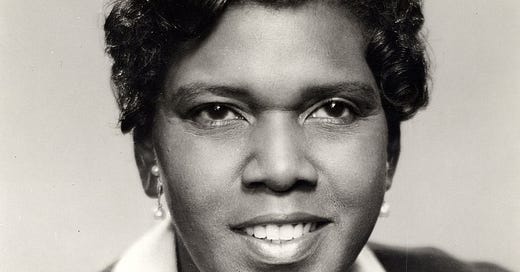Barbara Jordan
Introduction
In the early 1970s, the United States was embroiled in Watergate, a political scandal following a break-in at the Democratic National Committee headquarters at the Watergate office complex in Washington, D.C. This event led to the discovery of multiple abuses of power by President Nixon's administration and a subsequent cover-up. As the House Judiciary Committee began its impeachment inquiry against President Nixon, Barbara Jordan, a junior committee member, delivered her statement on national television.
Speaking with authority, clarity, and deep respect for the Constitution, she outlined the impeachment process and the constitutional foundation for it. Barbara began by emphasizing the importance of the inquiry, not just for the present but for preserving constitutional democracy for future generations. She made it clear that impeachment was not about partisan politics but about upholding the principles of the Constitution. She stated, "My faith in the Constitution is whole, it is complete, it is total. I am not going to sit here and be an idle spectator to the diminution, the subversion, the destruction of the Constitution."
Barbara's speech became one of the most memorable in American political history and profoundly impacted the nation. It reminded Americans of the importance of the rule of law and the checks and balances embedded in the Constitution. And her eloquence, intelligence, and moral authority brought clarity to a complex issue, earning her widespread admiration from the public and her colleagues in Congress.
Shortly after the speech, Barbara shared why she chose to vote for impeachment,
"Listen, I get goose pimples over the National Anthem and 'God Bless America.' I don't apologize for it. I feel very keenly about the necessity for this country to survive...having as its supreme law a constitution which remains inviolate. I feel this quite strongly.
The long-range hope I have for this country is that it will grow stronger and that everybody can feel that they're in it, that it really does belong to us. There are many of my constituents who are black and are poor who still do not feel that this country belongs to them, that the deal they have gotten is sour...I want to see the day when we—everybody—can feel like we belong here, that this country has to survive because we have to survive...I'd like to see that happen, but it takes strong, moral leadership from the top."
For Barbara, who was not yet 40 years old at the time, it was a moment years in the making and marked the beginning of her rise to national fame.
Early Years
Barbara was born in Houston, Texas, on February 21, 1936. She was the youngest of three daughters born to Benjamin, a Baptist minister, and Arlyne, a domestic worker.
Keep reading with a 7-day free trial
Subscribe to Historical Snapshots to keep reading this post and get 7 days of free access to the full post archives.




